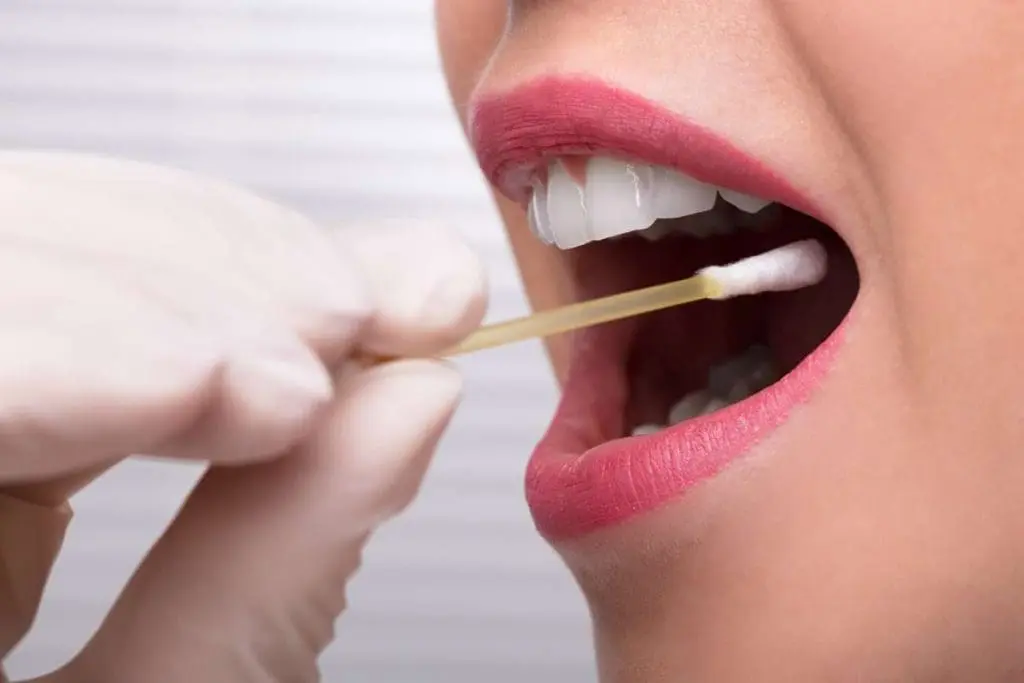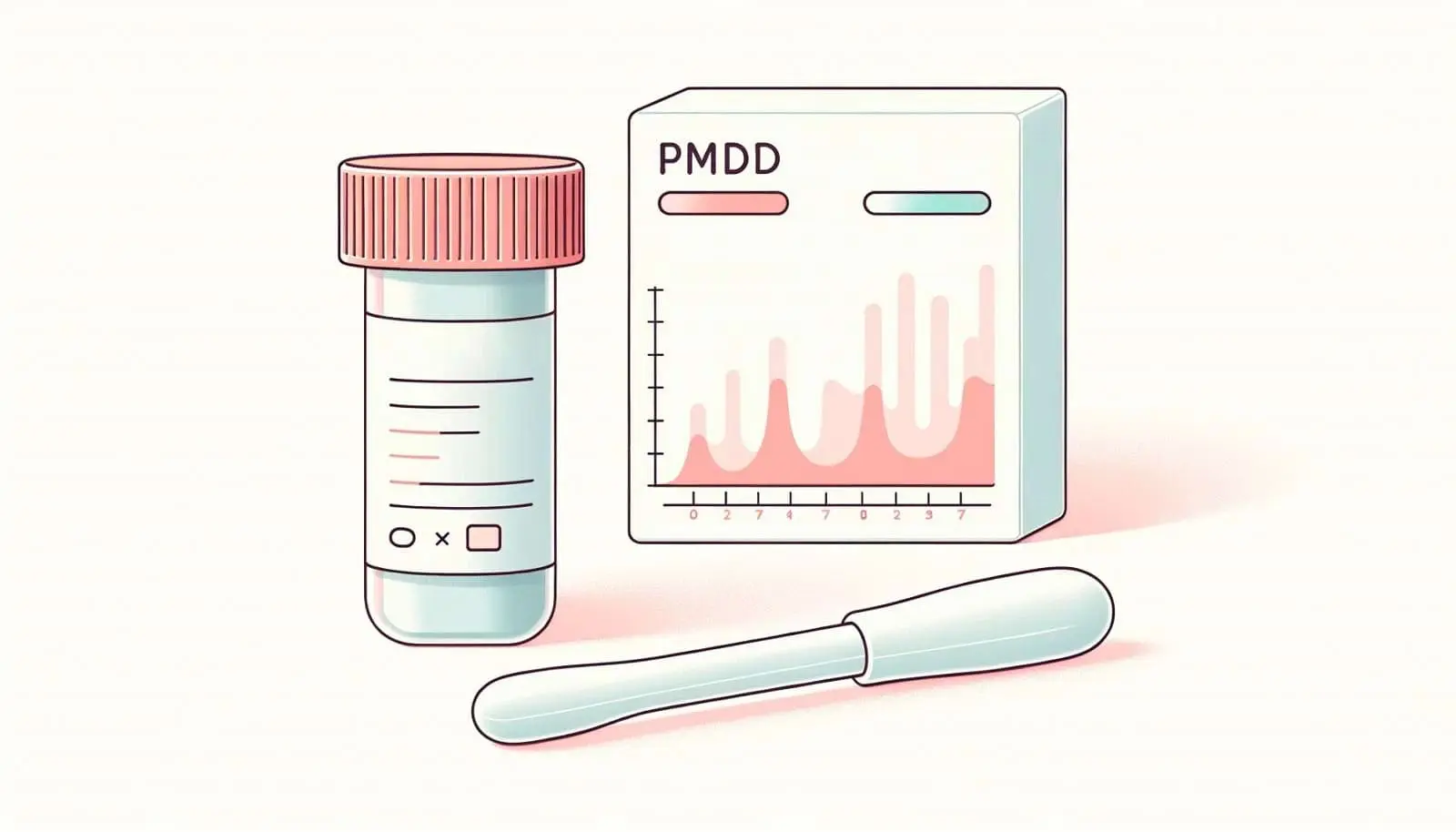The time of the month has arrived, you’re feeling emotional and irritable, you’re sleepless, and your skin is breaking out. These are all typical symptoms of pre-menstrual syndrome (PMS). But if you have premenstrual dysphoric disorder (PMDD), your symptoms could be much worse.
PMDD is a life-altering condition that puts women at risk of suicide and requires an accurate diagnosis. There are many ways to diagnose PMDD, including the use of a PMDD saliva test (although the test alone is not conclusive).
Let’s look at what PMDD is, its impact on women’s lives, how doctors test for PMDD, and potential treatment options.
Table of Contents
Unraveling PMDD: Beyond the Symptoms

PMDD is a severe form of PMS. Like PMS, it causes both emotional and physical symptoms a week or two before your period.
However, PMDD is far more debilitating. Sufferers report depression, severe anxiety, lack of energy, hopelessness, anger, sleep problems, muscle and joint pain, weight gain, and more. More than a temporary nuisance, these symptoms can lead to significant distress and functional impairment. People suffering from PMDD can develop suicidal thoughts and act impulsively, such as leaving relationships or quitting jobs.
According to the National Institute of Health (NIH), PMDD affects 5% to 8% of women.
The causes of PMDD are not well understood. PMDD is associated with the menstrual cycle but is not classified as a hormonal imbalance. Instead, NIH researchers have identified PMDD as a hyper-sensitive response in the brain to the regular hormonal fluctuations that occur during the monthly menstrual cycle.
PMDD is also worsened by factors such as genetics, smoking, prior trauma, and stress. Research is ongoing into the causes of PMDD, but researchers believe that a combination of these factors typically triggers PMDD.
Saliva Tests: The New Frontier in Hormonal Diagnosis

Because of PMDD’s life-impacting nature, it’s important to obtain the right diagnosis. Saliva tests are the gold standard for tracking a woman’s hormone levels, but they cannot diagnose PMDD.
That’s not to say PMDD saliva tests are without value. When combined with other diagnostics, a PMDD saliva test can be used to rule out underlying disorders, such as hormone imbalances or endocrinological conditions, and can provide helpful insights to guide treatment decisions.
How Saliva Tests Work
Saliva tests measure the level of hormones circulating in a woman’s body and are more accurate than blood tests at detecting excess or deficient hormones.
PMDD saliva tests are non-invasive. You simply spit into a test tube or swab your mouth and the sample is sent to a laboratory for analysis. For an accurate diagnosis, saliva samples should be collected at multiple intervals to measure changes in hormone levels over time.
Benefits Over Traditional Testing Methods
Saliva tests are generally considered more useful than blood tests for detecting hormonal imbalances. This is because saliva contains many hormones, such as estrogen and cortisol.
PMDD saliva testing is also convenient and cost effective. Patients can easily collect multiple samples at various moments of the day or month without incurring the cost, inconvenience, and invasiveness of blood testing.
Myths and Realities: PMDD and Saliva Tests
Managing PMDD requires an accurate diagnosis. But due to a lack of information about PMDD, many medical providers overlook the importance of a PMDD saliva test. Instead, women are often advised to track their symptoms a week or two before their period for a span of at least two menstrual cycles.
For a doctor to confirm PMDD, a woman must experience at least five very specific symptoms, such as acute depression, difficulty concentrating, feeling overwhelmed, irritability, and a change in appetite. It may be possible for your doctor to rule out PMDD if these symptoms do not interfere with your everyday life or occur outside the two weeks before your period.
It’s very important to get a PMDD diagnosis right because treatments are quite different to PMS or other mood disorders. If you think you’re experiencing symptoms, talk to your doctor about the value of adding a PMDD saliva test to your diagnostic process.
PMDD in the Workplace
Because women experience nine to twelve periods a year, the impacts of PMDD are long-term and far reaching. A person with PMDD may struggle to concentrate, maintain interpersonal relationships, multitask, and even perform basic workplace tasks without feeling exhausted, angry, or overwhelmed.
Awareness of PMDD and proper treatment are key to helping sufferers manage their conditions.
Natural Remedies: Are They Effective?

There are a variety of treatments for PMDD, the most effective being lifestyle changes such as eating a well-balanced diet, regular exercise, and rest and relaxation. Mood-stabilizing medications like antidepressants can also help.
Talk to your doctor about the right combination of methods. Connect with peer groups; for example, the International Association of Premenstrual Disorders (IAPMD) offers several options including video support groups, crisis referral, email support, a forum, and Facebook groups. Sharing experiences and remedies is important when dealing with this very serious yet often misunderstood and under-diagnosed condition.
FAQs About PMDD Saliva Test
How do doctors test for PMDD?
PMDD cannot be diagnosed with a single test. Testing for PMDD involves tracking symptoms over two or more menstrual cycles. However, a PMDD saliva test can help rule out underlying disorders such as a hormonal imbalance or endocrinological condition.
Can you test for hormonal imbalance with a saliva test?
Yes, a saliva test is an accurate and convenient way to diagnose hormonal imbalances.
What are the red flags for PMDD?
hen diagnosing PMDD, a medical provider will check for the presence of at least five emotional and physical symptoms. These include:
• Mood or emotional changes
• Irritability or anger
• Depression, hopelessness, worthlessness
• Anxiety
• Decreased interest in everyday activities
• Difficulty concentrating or brain fog
• Changes in appetite or food disorders such as binge eating.
• Feeling overwhelmed
• Suicidal thoughts or self-harm
• Tiredness or low energy
• Joint or muscle pain
• Breast tenderness
• Bloating or weight gain
A PMDD diagnosis is typically only confirmed if these symptoms are present a week or two before a woman’s period and for a span of at least two menstrual cycles.
How can I get help for PMDD?
Talk to your doctor or connect with peer groups.
The International Association of Premenstrual Disorders (IAPMD) offers peer support in several ways including video support groups, crisis referral, email support, a forum, and Facebook groups.
PMDD Saliva Test: Decoding the Future of Diagnosis
PMDD is a very serious condition that affects 5% of women. Unfortunately, medical providers lack understanding of PMDD and confuse it with PMS, so sufferers are rarely offered diagnostic or treatment options.
For these reasons, it’s important that women advocate for themselves. If a doctor can’t help you get a diagnosis, find another.
Advancements in testing, including PMDD saliva testing, can help improve current approaches to diagnostics.
If you’re suffering and believe PMDD is the cause, talk to your doctor about tracking your symptoms and available diagnostics.
PMDD is a diagnosis that impacts the workplace. Learn more about how Acuity’s Occupational Health Services, including our Absence Case Management Services, can help your organization manage short- and long-term leave related to PMDD.
